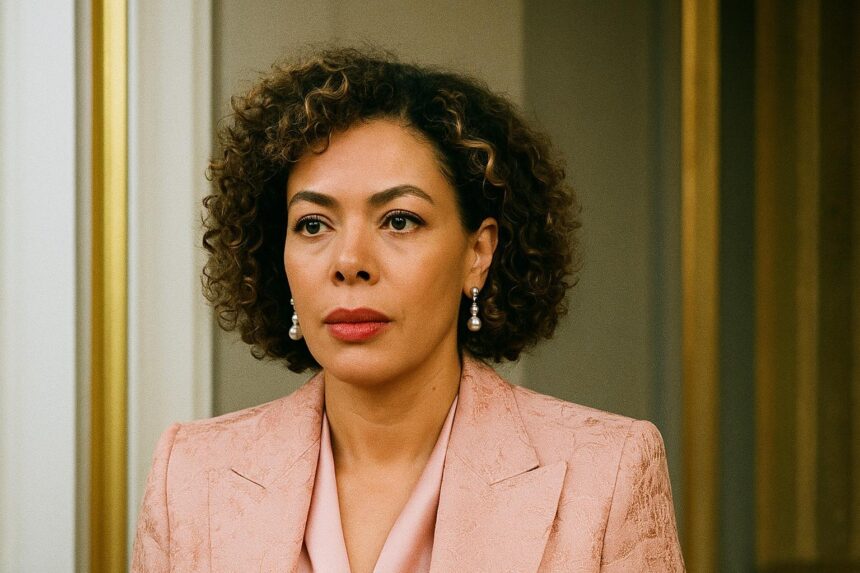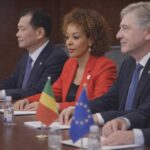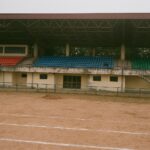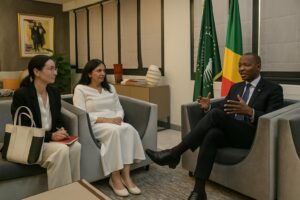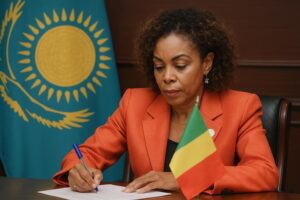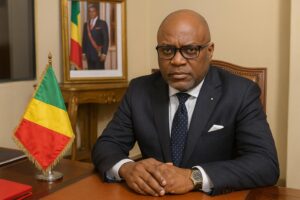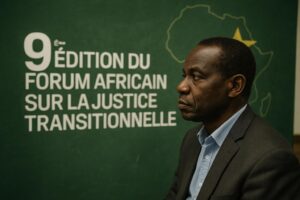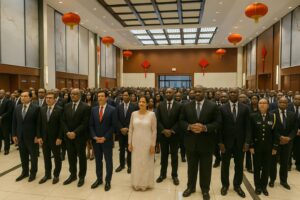A discreet arrival with oversized implications
Brazzaville’s emissary Dr Françoise Joly arrived in Washington with little fanfare yet considerable strategic intent. Appointed Personal Representative of President Denis Sassou Nguesso for strategic affairs and international negotiations, Dr Joly met senior State Department officials, including Deputy Assistant Secretary Corina Sanders, in what both sides later described as “particularly constructive” exchanges. While the closed-door format preserved diplomatic discretion, subsequent readouts underscored a renewed momentum in bilateral channels (Department of State media briefing).
- A discreet arrival with oversized implications
- The travel-ban question: symbolism beyond visas
- Economic diversification meets Washington’s renewed Africa calculus
- Climate security and the Congo Basin narrative
- Security cooperation: low-profile yet essential
- Soft power and the messenger factor
- Calibrated optimism for the road ahead
The travel-ban question: symbolism beyond visas
Central to Dr Joly’s agenda was the restrictive visa regime affecting Congolese nationals. According to officials familiar with the file, Brazzaville submitted updated compliance data on anti-trafficking and documentation standards, satisfying some of Washington’s technical prerequisites. Sources on both sides suggest that a phased easing, rather than a blanket lift, is under discussion, contingent on continued procedural alignment. For many Congolese entrepreneurs thwarted by mobility barriers, even a partial removal would resonate as a confidence-building signal surpassing its administrative scope.
Economic diversification meets Washington’s renewed Africa calculus
Beyond mobility, the talks explored investment pipelines in agribusiness, digital infrastructure and energy transition. Congo’s ambition to shift from hydrocarbons to a mixed portfolio of natural-gas monetisation and large-scale solar dovetails with the United States’ Prosper Africa initiative, which aims to channel private capital into scalable African projects. Several interlocutors confirmed that preliminary discussions touched on capacity-building grants from the US International Development Finance Corporation and technology transfers by mid-sized American firms seeking first-mover advantage in Central Africa. While no deals were signed, the alignment of policy frameworks was widely regarded as the prerequisite milestone.
Climate security and the Congo Basin narrative
Brazzaville’s stewardship of the Congo Basin—the planet’s second-largest tropical rainforest—has become a diplomatic calling card. Dr Joly leveraged that asset in Washington, emphasising President Sassou Nguesso’s ‘Triple A’ initiative on forest conservation, energy access and adaptation finance. US officials, mindful of their own climate-credibility agenda, were receptive to joint carbon-market mechanisms and satellite-based monitoring of deforestation hot spots. Analysts note that pairing environmental diplomacy with tangible climate finance claims could embed Congo more firmly in multilateral green finance circuits, reinforcing its strategic relevance beyond hydrocarbons.
Security cooperation: low-profile yet essential
Though absent from public communiqués, regional security reportedly featured in the deliberations. With Sahelian instability rippling toward the Gulf of Guinea, both parties examined maritime domain awareness and the interoperability of rapid-response units. The US Africa Command’s existing training program in Pointe-Noire is expected to resume later this year pending logistical synchronisation. This measured cooperation aligns with Brazzaville’s preference for pragmatic security partnerships that eschew high-visibility troop deployments.
Soft power and the messenger factor
Seasoned observers insist that personalities matter in diplomacy. Dr Joly, a physician-turned-negotiator fluent in English, French and Lingala, has cultivated a professional network in policy circles from Brussels to Addis Ababa. Her American counterparts, eager for unencumbered channels amid geopolitical turbulence, appear to value her technocratic style. A senior congressional aide, speaking on background, described her as “solution-oriented and refreshingly non-bombastic.” That assessment, echoed in Washington think-tank corridors, suggests that the messenger herself has become part of the message of Congo’s diplomatic modernisation.
Calibrated optimism for the road ahead
While progress on the travel ban, climate finance and security collaboration remains conditional, the Washington meetings demonstrate that methodical engagement can recalibrate relationships once deemed dormant. For Brazzaville, the dividends include diversified economic partnerships and enhanced geopolitical heft. For Washington, a reliable interlocutor in Central Africa advances strategic aims of regional stability and climate stewardship without entangling troop commitments. As one veteran US diplomat quipped privately, “This is diplomacy through incrementalism, not grand bargains—but that is often how durable ties are built.” In that sense, Dr Joly’s mission may indeed have opened a new chapter, written in measured yet indelible ink.

